| Ray Charles: "Genius
+ Soul = Jazz" (Impulse!, März 1961) |
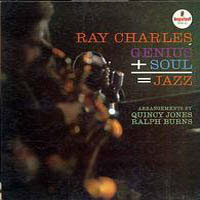 Der
einzige mir bekannte Fall, bei dem man eine Schallplatte über eine mathematische
Formel erklären - und dann auch benennen - kann. Eine wenig bekannte Tatsache
ist, das Ray Charles einer der ersten Künstler auf dem damals neuen Label
war. ABC als Impulse-Eigentümer hatte ihn zuvor von Atlantic abgeworben
und ließ ihn hier an der Orgel mit einer Bigband im Rücken jazzen, später
auch sehr erfolgreich Countrysongs aufnehmen ("Modern Sounds In Country
And Western Music"). Letzteres natürlich nicht beim Impulse-Label.
Aufgenommen am 26. und 27. Dez. 1960 Der
einzige mir bekannte Fall, bei dem man eine Schallplatte über eine mathematische
Formel erklären - und dann auch benennen - kann. Eine wenig bekannte Tatsache
ist, das Ray Charles einer der ersten Künstler auf dem damals neuen Label
war. ABC als Impulse-Eigentümer hatte ihn zuvor von Atlantic abgeworben
und ließ ihn hier an der Orgel mit einer Bigband im Rücken jazzen, später
auch sehr erfolgreich Countrysongs aufnehmen ("Modern Sounds In Country
And Western Music"). Letzteres natürlich nicht beim Impulse-Label.
Aufgenommen am 26. und 27. Dez. 1960 |
| Oliver Nelson: "The
Blues And The Abstract Truth" (Impulse!, Aug. 1961) |
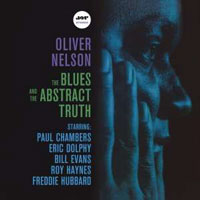 Nachdem mir schon die Kopie bzw. Fortsetzung
"More Blues And The Abstract Truth"
so gut gefallen hat, wollte ich natürlich nicht mehr auf das Original
warten - und bin begeistert! Ein Meisterwerk? Aber sicher! Man kann es
bedenkenlos in eine Reihe mit dem Mingus-Werk "The
Black Saint And The Sinner Lady" stellen.
Nachdem mir schon die Kopie bzw. Fortsetzung
"More Blues And The Abstract Truth"
so gut gefallen hat, wollte ich natürlich nicht mehr auf das Original
warten - und bin begeistert! Ein Meisterwerk? Aber sicher! Man kann es
bedenkenlos in eine Reihe mit dem Mingus-Werk "The
Black Saint And The Sinner Lady" stellen.
Aufgenommen im Septett und nicht wie immer gerne behauptet
wird im Sextett. Zwar ist bekannt, dass Oliver Nelson auf
diesen Aufnahmen im Unterschied zu vielen späteren Alben, auch zu
"More Blues And The Abstract Truth",
selber an Tenor- und Altsaxofon zu hören ist, wenn auch Kollege Eric
Dolphy wohl das virtuosere bzw. auffälligere Saxofon spielt.
Neben den bekannten Musikern Paul Chambers (Bass), Freddie
Hubbard (Trompete), Bill Evans (Piano) und Roy Haynes
(Schlagzeug) ist noch der Baritonsaxofonist George Barrow dabei,
der als einziger auf der Vorderseite des Covers keine Erwähnung findet.
Warum auch immer.
(02.12.2012)

 Mehr ...
Mehr ...
As Oliver Nelson is known primarily as a big band leader and arranger, he is lesser known as a saxophonist and organizer of small ensembles. Blues and the Abstract Truth is his triumph as a musician for the aspects of not only defining the sound of an era with his all-time classic "Stolen Moments," but on this recording, assembling one of the most potent modern jazz sextets ever. Lead trumpeter Freddie Hubbard is at his peak of performance, while alto saxophonists Nelson and Eric Dolphy (Nelson doubling on tenor) team to form an unlikely union that was simmered to perfection. Bill Evans (piano), Paul Chambers (bass), and Roy Haynes (drums) can do no wrong as a rhythm section. "Stolen Moments" really needs no comments, as its undisputable beauty shines through in a three-part horn harmony fronting Hubbard's lead melody. It's a thing of beauty that is more timeless as the years pass. The "Blues" aspect is best heard on "Yearnin'," a stylish, swinging, and swaying downhearted piece that is a bluesy as Evans would ever be. Both "Blues" and "Abstract Truth" combine for the darker "Teenie's Blues," a feature for Nelson and Dolphy's alto saxes, Dolphy assertive in stepping forth with his distinctive, angular, dramatic, fractured, brittle voice that marks him a maverick. Then there's "Hoedown," which has always been the black sheep of this collection with its country flavor and stereo separated upper and lower horn in snappy call-and-response barking. As surging and searing hard boppers respectively, "Cascades" and "Butch & Butch" again remind you of the era of the early '60s when this music was king, and why Hubbard was so revered as a young master of the idiom. This CD is a must buy for all jazz collectors, and a Top Ten-Fifty favorite for many.
(by Michael G. Nastos, All Music Guide)
|
| John Coltrane:
"Africa/Brass" (Impulse!, Nov. 1961) |
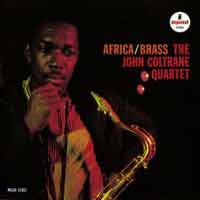 Neben
"A Love Supreme" von
1965 ist das hier mein klarer Coltrane-Favorit. Zum Kernquartett (McCoy
Tyner am Piano, Elvin Jones am Schlagzeug und Reggie Workman
am Bass) kam ein hochkarätiger Bläsersatz, aus dem ich nur ein
paar etwas bekanntere Namen nennen möchte: Freddie
Hubbard und Booker Little (Trompeten), Eric Dolphy (Altsaxofon
und Bassklarinette) und Julian Priester (Posaune). Neben
"A Love Supreme" von
1965 ist das hier mein klarer Coltrane-Favorit. Zum Kernquartett (McCoy
Tyner am Piano, Elvin Jones am Schlagzeug und Reggie Workman
am Bass) kam ein hochkarätiger Bläsersatz, aus dem ich nur ein
paar etwas bekanntere Namen nennen möchte: Freddie
Hubbard und Booker Little (Trompeten), Eric Dolphy (Altsaxofon
und Bassklarinette) und Julian Priester (Posaune).

 Mehr ...
Mehr ...
|
John Coltrane's debut for the Impulse label was a bit unusual for the
great tenor and his quartet were joined by a medium-sized backup group
on Eric Dolphy arrangements of "Africa," "Greensleeves"
and "Blues Minor." "Africa" in particular is quite
memorable although Coltrane would not pursue any further recordings in
this direction in the future, making this a change of pace in his discography.
The music of this LP has since been reissued on CD.
(by Scott Yanow, All
Music Guide)
|
|
| Miles Davis: "Someday My
Prince Will Come" (Columbia, Dez. 1961) |
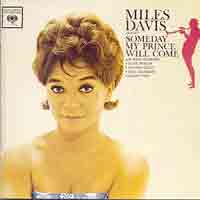 Ein
eher unbekanntes, aber wunderschönes Album von Miles aus einer Übergangsphase.
Zum letzten Mal ist Miles mit John Coltrane
und Philly Joe Jones aus seinem berühmten Quintett der späten 50er
in Gastrollen zu hören. Als zweiter Saxofonist ist Hank Mobley dabei.
Am Piano saß Wynton Kelly, Jimmy Cobb (dr) und Paul Chambers
(b) bildeten die Rhythmusgruppe. Ein
eher unbekanntes, aber wunderschönes Album von Miles aus einer Übergangsphase.
Zum letzten Mal ist Miles mit John Coltrane
und Philly Joe Jones aus seinem berühmten Quintett der späten 50er
in Gastrollen zu hören. Als zweiter Saxofonist ist Hank Mobley dabei.
Am Piano saß Wynton Kelly, Jimmy Cobb (dr) und Paul Chambers
(b) bildeten die Rhythmusgruppe. |
| Freddie Hubbard: "Ready
For Freddie" (Blue Note, 1961) |
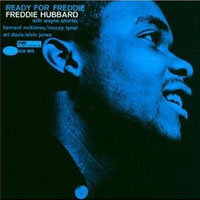 Kein besonders kreativer LP-Titel, aber eines der besten Alben eines der
besten Jazztrompeter. "High End Blue Note" sozusagen, Dank Freddie
Hubbard, Tonmeister Rudy van Gelder (wer sonst?) und der tollen
Band: Schlagzeuger Elvin Jones, Pianist McCoy Tyner und
Bassist Art Davis vom Coltrane Quartett
(bei Art Davis bin ich mir nicht sicher, ob er fest dort dabei oder nur
"Ergänzungsspieler" war), dazu der damals noch "junge"
Tenorsaxofonist Wayne Shorter und Euphoniumspieler Bernard McKinney
(der nannte sich später Kiane Zawadi, warum auch immer), aufgenommen
am 12. August 1961. Das im Jazz eher selten eingesetzte Euphonium liegt
von der Lage her zwischen der Trompete und der Tuba und klingt für
ungeübte Ohren (also meine) wie eine Posaune.
Kein besonders kreativer LP-Titel, aber eines der besten Alben eines der
besten Jazztrompeter. "High End Blue Note" sozusagen, Dank Freddie
Hubbard, Tonmeister Rudy van Gelder (wer sonst?) und der tollen
Band: Schlagzeuger Elvin Jones, Pianist McCoy Tyner und
Bassist Art Davis vom Coltrane Quartett
(bei Art Davis bin ich mir nicht sicher, ob er fest dort dabei oder nur
"Ergänzungsspieler" war), dazu der damals noch "junge"
Tenorsaxofonist Wayne Shorter und Euphoniumspieler Bernard McKinney
(der nannte sich später Kiane Zawadi, warum auch immer), aufgenommen
am 12. August 1961. Das im Jazz eher selten eingesetzte Euphonium liegt
von der Lage her zwischen der Trompete und der Tuba und klingt für
ungeübte Ohren (also meine) wie eine Posaune.
(28.05.2008)

 Mehr ...
Mehr ...
Trumpeter Freddie Hubbard really came into his own during this Blue Note session. He is matched with quite an all-star group (tenor saxophonist Wayne Shorter, pianist McCoy Tyner, bassist Art Davis, and drummer Elvin Jones in addition to Bernard McKinney on euphonium), introduces two of his finest compositions ("Birdlike" and "Crisis"), and is quite lyrical on his ballad feature, "Weaver of Dreams." Hubbard's sidemen all play up to par and this memorable session is highly recommended; it's one of the trumpeter's most rewarding Blue Note albums.
(by Scott Yanow, All Music Guide)
|
| Robert Johnson:
"King Of The Delta Blues Singers" (Columbia, 1961) |
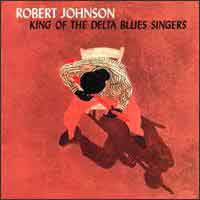 Erst diese lange nach seinem Tod veröffentlichten Aufnahmen von
1936/37 brachten Robert Johnson die verdiente Anerkennung als einer
der wichtigsten Bluessänger aller Zeiten.
Erst diese lange nach seinem Tod veröffentlichten Aufnahmen von
1936/37 brachten Robert Johnson die verdiente Anerkennung als einer
der wichtigsten Bluessänger aller Zeiten.

 Mehr ...
Mehr ...
| "Reading about the power inherent in Robert Johnson's music
is one thing, but actually experiencing it is another matter entirely. The
official 1998 edition of the original 1961 album was certainly worth the
wait, remastered off the best-quality original 78s available, of far superior
quality to any of the source materials used on even the 1991 box set. Johnson's
guitar takes on a fullness never heard on previous reissues, and except
for a nagging hiss in spots on "Terraplane Blues" (the equalization
on this disc is extreme to even sport some minute turntable rumble in the
low end), this really brings his music alive. If there is such a thing as
a greatest-hits package available on Johnson, this landmark album, which
jump-started the whole '60s blues revival, would certainly be the one. The
majority of Johnson's best-known tunes, the ones that made the legend, are
all aboard: "Crossroads," "Walkin' Blues," "Me
& The Devil Blues," "Come On In My Kitchen," and the
apocalyptic visions contained in "Hellhound On My Trail" are the
blues at its finest, the lyrics sheer poetry. And making its first appearance
anywhere is a newly discovered-in-1998 alternate take of "Traveling
Riverside Blues" that's appended to the original 16-track lineup. If
you are starting your blues collection from the ground up, be sure to make
this your very first purchase." (Cub Koda, All Music Guide) |
|
| Roland Kirk with Jack McDuff:
"Kirk's Work" (Prestige, 1961) |
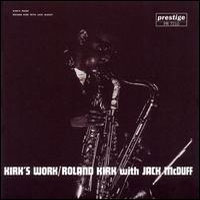 Ein frühes Album vom Mann, der auf drei Saxofonen (ein "normales"
Tenor, dazu die zwei exotischen Gebläse "Manzello" und "Strich")
simultan fantastische Musik macht, ohne dass das zu einem Witz wird.
Noch ohne seinen späteren Vornamen "Rahsaan" und mit einem Klasseband:
"Brother" Jack McDuff an der Hammondorgel, Bassist Joe
Benjamin und Trommler Art Taylor.
Ein frühes Album vom Mann, der auf drei Saxofonen (ein "normales"
Tenor, dazu die zwei exotischen Gebläse "Manzello" und "Strich")
simultan fantastische Musik macht, ohne dass das zu einem Witz wird.
Noch ohne seinen späteren Vornamen "Rahsaan" und mit einem Klasseband:
"Brother" Jack McDuff an der Hammondorgel, Bassist Joe
Benjamin und Trommler Art Taylor.
(11.05.2009)

 Mehr ...
Mehr ...
Kirk's Work — Rahsaan Roland Kirk's third long-player — teams him up with organist "Brother" Jack McDuff for Kirk's most soulful post-bop set to date. His unorthodox performance style incorporates the polyphonies of a tenor sax, flute, manzello, and stritch. The latter instrument is Kirk's own modification of a second-generation B-flat soprano sax. This contributes to the unique sonic textures and overtones Kirk creates when playing two — and often three — of those lead instruments simultaneously. The loose and soulful nature of McDuff's Hammond organ lends itself to the swinging R&B vibe pervasive throughout the album. Completing the quartet is Joe Benjamin (bass) and Art Taylor (drums) — both veteran jazzmen in their own right. They lend their expertise as well as innate sense of rhythm to the up-tempo "revival meetin'" rendition of Sammy Kahn's "Makin' Whoopee" as well as the ominous swing of the title track. This is also an ideal showcase for Benjamin and Taylor's running counterpoint that glides throughout — supporting soloists Kirk and McDuff. Of the four original Kirk compositions, "Doin' the Sixty-Eight" is arguably the strongest. The percussive rhythms weave a hypnotic Latin groove over which Kirk and McDuff both snake some highly cerebral solos. The stellar interpretation of "Skater's Waltz" combines a well-known traditional melody with some of the most aggressive interaction from the quartet. The tune is put through its paces and the tenor sax/Hammond organ leads bounce around like a game of sonic ping pong. The more aggressive performance style that Kirk would later incorporate definitely shows signs of development on Kirk's Work. While certainly not the best in his catalog, it is a touchstone album that captures the early soulful Rahsaan Roland Kirk.
(by Lindsay Planer, All Music Guide)
|
 Der
einzige mir bekannte Fall, bei dem man eine Schallplatte über eine mathematische
Formel erklären - und dann auch benennen - kann. Eine wenig bekannte Tatsache
ist, das Ray Charles einer der ersten Künstler auf dem damals neuen Label
war. ABC als Impulse-Eigentümer hatte ihn zuvor von Atlantic abgeworben
und ließ ihn hier an der Orgel mit einer Bigband im Rücken jazzen, später
auch sehr erfolgreich Countrysongs aufnehmen ("Modern Sounds In Country
And Western Music"). Letzteres natürlich nicht beim Impulse-Label.
Aufgenommen am 26. und 27. Dez. 1960
Der
einzige mir bekannte Fall, bei dem man eine Schallplatte über eine mathematische
Formel erklären - und dann auch benennen - kann. Eine wenig bekannte Tatsache
ist, das Ray Charles einer der ersten Künstler auf dem damals neuen Label
war. ABC als Impulse-Eigentümer hatte ihn zuvor von Atlantic abgeworben
und ließ ihn hier an der Orgel mit einer Bigband im Rücken jazzen, später
auch sehr erfolgreich Countrysongs aufnehmen ("Modern Sounds In Country
And Western Music"). Letzteres natürlich nicht beim Impulse-Label.
Aufgenommen am 26. und 27. Dez. 1960 Nachdem mir schon die Kopie bzw. Fortsetzung
"More Blues And The Abstract Truth"
so gut gefallen hat, wollte ich natürlich nicht mehr auf das Original
warten - und bin begeistert! Ein Meisterwerk? Aber sicher! Man kann es
bedenkenlos in eine Reihe mit dem Mingus-Werk "The
Black Saint And The Sinner Lady" stellen.
Nachdem mir schon die Kopie bzw. Fortsetzung
"More Blues And The Abstract Truth"
so gut gefallen hat, wollte ich natürlich nicht mehr auf das Original
warten - und bin begeistert! Ein Meisterwerk? Aber sicher! Man kann es
bedenkenlos in eine Reihe mit dem Mingus-Werk "The
Black Saint And The Sinner Lady" stellen. Mehr ...
Mehr ...
 Neben
"A Love Supreme" von
1965 ist das hier mein klarer Coltrane-Favorit. Zum Kernquartett (McCoy
Tyner am Piano, Elvin Jones am Schlagzeug und Reggie Workman
am Bass) kam ein hochkarätiger Bläsersatz, aus dem ich nur ein
paar etwas bekanntere Namen nennen möchte: Freddie
Hubbard und Booker Little (Trompeten), Eric Dolphy (Altsaxofon
und Bassklarinette) und Julian Priester (Posaune).
Neben
"A Love Supreme" von
1965 ist das hier mein klarer Coltrane-Favorit. Zum Kernquartett (McCoy
Tyner am Piano, Elvin Jones am Schlagzeug und Reggie Workman
am Bass) kam ein hochkarätiger Bläsersatz, aus dem ich nur ein
paar etwas bekanntere Namen nennen möchte: Freddie
Hubbard und Booker Little (Trompeten), Eric Dolphy (Altsaxofon
und Bassklarinette) und Julian Priester (Posaune).
 Mehr ...
Mehr ...
 Ein
eher unbekanntes, aber wunderschönes Album von Miles aus einer Übergangsphase.
Zum letzten Mal ist Miles mit John Coltrane
und Philly Joe Jones aus seinem berühmten Quintett der späten 50er
in Gastrollen zu hören. Als zweiter Saxofonist ist Hank Mobley dabei.
Am Piano saß Wynton Kelly, Jimmy Cobb (dr) und Paul Chambers
(b) bildeten die Rhythmusgruppe.
Ein
eher unbekanntes, aber wunderschönes Album von Miles aus einer Übergangsphase.
Zum letzten Mal ist Miles mit John Coltrane
und Philly Joe Jones aus seinem berühmten Quintett der späten 50er
in Gastrollen zu hören. Als zweiter Saxofonist ist Hank Mobley dabei.
Am Piano saß Wynton Kelly, Jimmy Cobb (dr) und Paul Chambers
(b) bildeten die Rhythmusgruppe. Kein besonders kreativer LP-Titel, aber eines der besten Alben eines der
besten Jazztrompeter. "High End Blue Note" sozusagen, Dank Freddie
Hubbard, Tonmeister Rudy van Gelder (wer sonst?) und der tollen
Band: Schlagzeuger Elvin Jones, Pianist McCoy Tyner und
Bassist Art Davis vom Coltrane Quartett
(bei Art Davis bin ich mir nicht sicher, ob er fest dort dabei oder nur
"Ergänzungsspieler" war), dazu der damals noch "junge"
Tenorsaxofonist Wayne Shorter und Euphoniumspieler Bernard McKinney
(der nannte sich später Kiane Zawadi, warum auch immer), aufgenommen
am 12. August 1961. Das im Jazz eher selten eingesetzte Euphonium liegt
von der Lage her zwischen der Trompete und der Tuba und klingt für
ungeübte Ohren (also meine) wie eine Posaune.
Kein besonders kreativer LP-Titel, aber eines der besten Alben eines der
besten Jazztrompeter. "High End Blue Note" sozusagen, Dank Freddie
Hubbard, Tonmeister Rudy van Gelder (wer sonst?) und der tollen
Band: Schlagzeuger Elvin Jones, Pianist McCoy Tyner und
Bassist Art Davis vom Coltrane Quartett
(bei Art Davis bin ich mir nicht sicher, ob er fest dort dabei oder nur
"Ergänzungsspieler" war), dazu der damals noch "junge"
Tenorsaxofonist Wayne Shorter und Euphoniumspieler Bernard McKinney
(der nannte sich später Kiane Zawadi, warum auch immer), aufgenommen
am 12. August 1961. Das im Jazz eher selten eingesetzte Euphonium liegt
von der Lage her zwischen der Trompete und der Tuba und klingt für
ungeübte Ohren (also meine) wie eine Posaune. Mehr ...
Mehr ...
 Erst diese lange nach seinem Tod veröffentlichten Aufnahmen von
1936/37 brachten Robert Johnson die verdiente Anerkennung als einer
der wichtigsten Bluessänger aller Zeiten.
Erst diese lange nach seinem Tod veröffentlichten Aufnahmen von
1936/37 brachten Robert Johnson die verdiente Anerkennung als einer
der wichtigsten Bluessänger aller Zeiten.
 Mehr ...
Mehr ...
 Ein frühes Album vom Mann, der auf drei Saxofonen (ein "normales"
Tenor, dazu die zwei exotischen Gebläse "Manzello" und "Strich")
simultan fantastische Musik macht, ohne dass das zu einem Witz wird.
Noch ohne seinen späteren Vornamen "Rahsaan" und mit einem Klasseband:
"Brother" Jack McDuff an der Hammondorgel, Bassist Joe
Benjamin und Trommler Art Taylor.
Ein frühes Album vom Mann, der auf drei Saxofonen (ein "normales"
Tenor, dazu die zwei exotischen Gebläse "Manzello" und "Strich")
simultan fantastische Musik macht, ohne dass das zu einem Witz wird.
Noch ohne seinen späteren Vornamen "Rahsaan" und mit einem Klasseband:
"Brother" Jack McDuff an der Hammondorgel, Bassist Joe
Benjamin und Trommler Art Taylor. Mehr ...
Mehr ...
